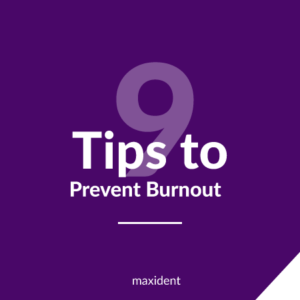
How do you know you’re on the road to burning out? Do you know what it means to burn out? You might think it’s the same as stress, but there are actually quite a few differences. According to Helpguide.org, burnout, unlike stress, is characterized by disengagement, blunted emotions, helplessness and hopelessness, loss of motivation, detachment and depression. The primary damage is emotional and may even make you feel like life just isn’t worth living. The effects of a burnout include long-term changes to your body that break down your immune system, making you vulnerable to illnesses. If you feel that you might be burning out, it is best to tend to it right away. It is important to note, however, that burnout can be brought on by stress so the less stress in your life the better.
Burnout stems from work. As a dental professional, you take on a lot of responsibility and may even feel overworked and undervalued. Do you feel like you have no control, or that your work is not recognized, or even that your job expectations are unclear or overly demanding? Try to look at the balance in your life. Are you taking enough time to socialize and relax? Are you lacking in close supportive relationships? Are you not getting enough sleep? A lack in any or all of these areas can eventually lead you to a burnout. How do you feel about yourself and what you do? Your attitude too can play a part. Personality traits such as perfectionism, pessimism, a need to be in control and reluctance to delegate to others can take a toll on you as well, encouraging those feelings of helplessness and hopelessness. It’s time to take a step back and reevaluate your job as a dental professional and your life. Here are several suggestions to help prevent a burnout.
1 Establish a support system
One prevention technique for those on the road to a burn out is having a solid support system. It is important to be able to talk to someone about your situation without feeling judged or questioned. Good friends and loved ones are there to listen. If your support system is minimal, there is always time to build new friendships and open yourself up. Try expanding your social network to include those you work with. Maintaining a support system is the best way to prevent a burn out.
2 Give to others
Being good to others, giving to others, and supporting others can have a positive impact not just on your life but on the lives you’re affecting with your kindness. It doesn’t take much, just a random act of kindness is enough to re-energize you and help you to find meaning in what you do.
3 Exercise
Even if you’re not in the mood to get up and move or walk or practice yoga, try and push yourself. There is nothing better to relieve stress than exercise. And if yoga isn’t for you or you don’t want to do cardio or strength training, do something fun. Dancing has the ability to make you sweat as well as smile. According to https://www.betterhealth.vic.gov.au/health/healthyliving/dance-health-benefits, dancing helps you stay fit, improves your muscle tone, strength, endurance and fitness. And it’s a great way to meet new people.
4 Change your diet
Nobody thinks their diet can affect the way they work, but the truth is, what we eat does affect how we think and act. Most people don’t realize the health drawbacks of missing breakfast, but it is the most important meal of the day for a reason. It is also important to step away from your desk or your office to eat. Give your brain a break from work to relax and recharge.
5 Reevaluate priorities
As a dental professional, you have a lot on your plate. Managing your priorities can help to lessen the burden. Consider how much time you spend working and what kind of stress that is putting on you. If you’re feeling overwhelmed, don’t be afraid to delegate the smaller tasks, allowing you to focus on the bigger and more important ones. Do not take work home with you.
6 Get a good sleep
Most people function on 6-8 hours of sleep a night, but the amount of hours you should be setting aside for sleep is eight every night. If sleep is difficult and your brain just won’t shut off, try meditating or yoga. I have always had issues turning my brain off to go to sleep but have since found a way to condition my brain and body to sleep when I need to. Create a routine for yourself and follow through on it. Soon, your body and brain will adjust to this routine, and you will be able to fall asleep earlier.
7 Increase self-efficacy
As someone who has been on the brink of a burn out a few times, I understand the importance of increasing self-efficacy. Psychology Today defines self-efficacy as “having the belief in your own ability to accomplish (and exercise control over) personally meaningful goals and tasks.” It’s believing you can cope with your situation, having faith that you can overcome the obstacles instead of giving in. This belief in yourself and your abilities reduces your anxiety and stress. Psychology Today suggests that to enhance self-efficacy, you should “find a self-efficacy “model.” Simply observing a friend or work colleague accomplish something meaningful is contagious and increases your ability to meet challenges head on (Bandura, 1997).”
8 Find something outside of work that you enjoy
Many people have hobbies, something they can turn to in order to relieve stress and provide happiness. Stretch your creative muscles by finding something that interests you. My dad has gotten into working on and learning to fly drones. I take time out of my day to write. Put aside some time for yourself and do something you want to do and not what you’re obligated to do. And more importantly, have fun!
9 Increase positive emotions
At a time when it feels like the entire world has been placed on your shoulders, your outlook on life could be seen through negative lenses, but it is up to you to try and change that outlook. How do you feel about the work you do? Do you love it? Does it provide value, a purpose? Think about how what you do changes other people and makes their lives better and give yourself a break. Don’t be so hard on yourself and try to focus on your accomplishments. It is difficult to change your frame of mind, but it isn’t impossible. Believe that what you do matters.
Negative thoughts about who we are and what purpose we serve can have a lasting and sometimes damaging impact on our physical and mental health. It is important to stay as positive as possible while maintaining a support system of friends and loved ones, getting enough sleep and exercise, and finding happiness outside of work. But it is also important to stay informed. Just like stress, it can be difficult to pinpoint when a burnout is or will occur. Below is a link to an online burnout self-test provided by mindtools.com. Take the short test and see where you land on the scale. Always remember to see your physician if things have taken a turn for the worse, which hopefully they never do.

Resources
- http://www.helpguide.org/articles/stress/preventing-burnout.htm
- https://www.psychologytoday.com/blog/pressure-proof/201306/7-strategies-prevent-burnout
- https://www.mindtools.com/pages/article/avoiding-burnout.htm
- https://www.mindtools.com/pages/article/newTCS_08.htm
- https://www.cdrcp.com/pdf/Burnout.pdf
- Bandura, A. (1997). Self-efficacy. New York: W.H. Freeman and Company.
Suggested Page:



